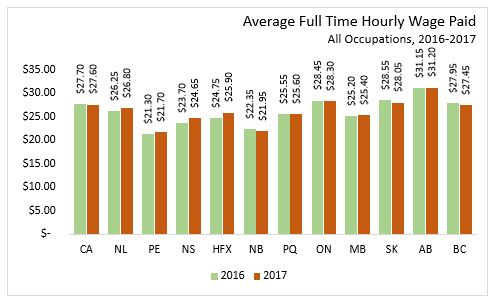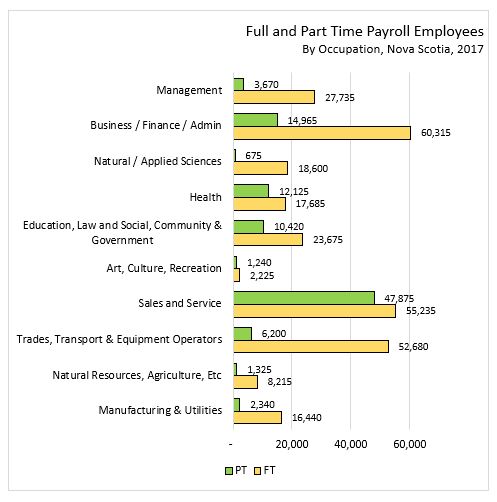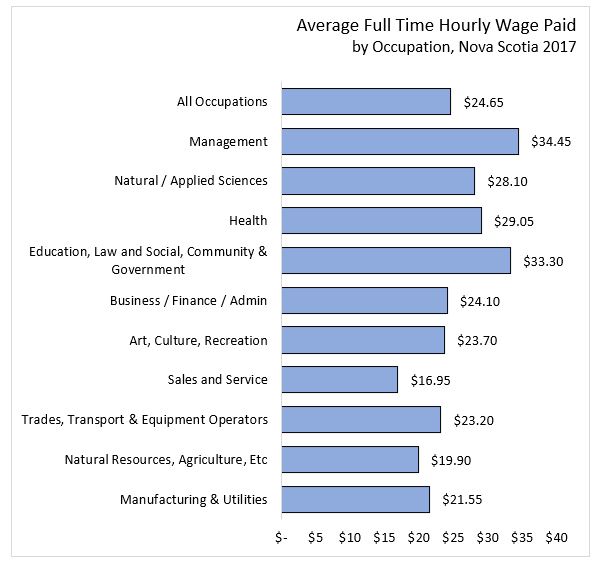The Economics and Statistics Division maintains archives of previous publications for accountability purposes, but makes no updates to keep these documents current with the latest data revisions from Statistics Canada. As a result, information in older documents may not be accurate. Please exercise caution when referring to older documents. For the latest information and historical data, please contact the individual listed to the right.
<--- Return to Archive
For additional information relating to this article, please contact:
June 27, 2018WAGES BY OCCUPATION, 2017 
According to Statistics Canada's Job Vacancy and Wage Survey, in 2017, the average full time hourly wage paid in Nova Scotia was $24.65, 10.7 per cent lower than the Canadian average ($27.60) and second highest in Atlantic Canada, behind Newfoundland and Labrador, with an average of $26.80 per hour. Compared to a 2016, all Atlantic provinces except New Brunswick saw average full time hourly wages increase.
Note that this survey produces estimates of employment but differs in methodology from the Labour Force Survey.
Across Canada, average full time hourly wages were highest in Alberta ($31.20) and Ontario ($28.30), and lowest in PEI ($21.70). New Brunswick, Ontario, Saskatchewan and British Columbia all saw declines in average full time hourly wages paid.
In Nova Scotia, 73.7 per cent of payroll employees were full-time. The sales and service occupations had the highest number of payroll employees by occupation (103,110), with 53.6 per cent of that occupation group being full-time. Full-time payroll employees dominated Natural and applied sciences (96.5%), trades and transport (89.5%), management occupations (88.3%), and manufacturing and utilities (87.5%). (Note: Totals in this survey equal 383,640 payroll employees. The Job Vacancy and Wage Survey differs from the Labour Force Survey, which estimated that in 2017, full time employment in Nova Scotia was 364,100 and part time employment was 84,900 for a total of 449,000.)

Full time hourly wages were highest in Management ($34.45), and Education ($33.30), and lowest in Sales and service occupations ($16.95 per hour).

Within Nova Scotia's economic regions, average full time hourly wages paid were highest in Cape Breton ($26.00) and Halifax ($25.90), the only two economic regions above the provincial average ($24.65). Full time hourly wages were lowest in the Annapolis region ($21.80). Average full time hourly wages increased in 2017 from 2016 in all economic regions except the Southern Region.

Within Nova Scotia's industries, full time hourly wages were highest in Professional, Scientific and Technical services ($33.90/hr), followed by Education ($33.85). Full time hourly wages were lowest in Accommodation and Food Services ($14.70). Note that several industries have suppressed data (indicated by N/A on the chart below).

Note: The data are drawn from the new wage component of the Job Vacancy and Wage Survey, which provides wage information by both detailed occupation and economic region on an annual basis. All wage data provided are for full-time employment and exclude overtime pay, tips, and incentive and performance pay, such as commissions and bonuses.
The 'employee' concept used in the Job Vacancy and Wage Survey (JVWS) is comprised of full-time employees, part-time employees, as well as permanent, casual, temporary, and seasonal employees. It also includes working owners, directors, partners, and other officers of incorporated businesses, as well as employees who work at home or on the road but report to the location. The 'employee' concept used in the JVWS is meant to exclude owners or partners of unincorporated businesses and professional practices, the self-employed, subcontractors, external consultants, unpaid family workers, persons working outside Canada, and military personnel. It also excludes employees on unpaid leave, such as those on extended sick leave who are receiving insurance benefits.
A full-time employee works 30 or more hours per week.
A part-time employee works less than 30 hours per week.
Source: CANSIM Tables 14-10-00001-01, 14-10-0080-01, and 14-10-0103-01
<--- Return to Archive